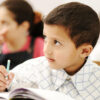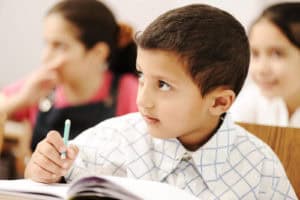
Why Vision Problems Start When School Starts
Vision problems often become evident in children right after school starts each year. This is especially true of children who are going to school for the first time. There are new activities and challenges they experience at school that they don’t at home. For example, reading notes from the board or watching movies on a screen at the front of the room. Even learning to write on the paper in front of them can be challenging with certain eye conditions.
When children have problems reading, their academic capabilities are affected. Reading and writing are integral parts of learning. They provide the foundation for all other school subjects. Correcting vision problems that affect reading and writing is crucial. Unfortunately, we often don’t notice our children’s visual struggles until they go back to school every fall.
Some people wonder why it isn’t until after school starts that these vision problems are detected. Why is it that they weren’t detected during the previous school year or the summer? There are several reasons why this happens.
Increased Visual Demands
 As a child moves from one grade to the next, the schoolwork becomes more difficult. There are more things to read and write, and homework becomes more challenging. In addition, the size of the text becomes smaller as children move up into higher grades. This, coupled with the requirement to read more for longer periods of time, can bring to light vision problems. After all, more people are becoming nearsighted than ever before, so it’s not surprising that you may discover that your child struggles with close work once school starts.
As a child moves from one grade to the next, the schoolwork becomes more difficult. There are more things to read and write, and homework becomes more challenging. In addition, the size of the text becomes smaller as children move up into higher grades. This, coupled with the requirement to read more for longer periods of time, can bring to light vision problems. After all, more people are becoming nearsighted than ever before, so it’s not surprising that you may discover that your child struggles with close work once school starts.
The vision problems may have been there for a while, but the problems weren’t severe enough to be noticeable. Since more stress is put on a child’s eyes as they get older, the vision problems that weren’t noticeable before start worsening. And, since children are accustomed to their own vision, they might not even know they have a problem.
Parents and Teachers Become Aware
The vision problems may not have been detected in previous school years because the child’s learning may not have been affected. Less severe vision issues impact their learning less. Also, if the child was acting out or if their schoolwork was suffering, the problem could have been attributed to something else. For example, communication problems between the child and the teacher or problems with other kids causing distractions in the classroom. Many children are also misdiagnosed with ADHD when it’s actually vision problems causing their behavior.
As the child’s vision problems worsen in the new school year, they begin to struggle more with homework and schoolwork. It may become clear to the parents that there is something besides ADHD and other issues that are causing their child to fall behind.
Teachers may also become aware that their student is having a hard time when reading or completing homework. They may even be having difficulties seeing the board in the front of the classroom. They may also have trouble working on small screens, especially as more and more classrooms move toward electronic instructional materials. The teacher may notice a few things, and will then bring the issue up with the parents. This is sometimes how the child’s vision problems are eventually discovered.
Vision Awareness Programs
Many schools and teachers are becoming more knowledgeable about how to spot vision problems in children. As well as learning about the types of vision problems that most commonly occur in school-aged children. Children spend a lot of time with their teachers during the school year where they are reading and writing under the teacher’s supervision. It’s more likely that a teacher will notice a vision problem in a child before the child’s parents might.
When children are at home, they usually aren’t reading and writing nearly as much as they do at school. So, the parents may not notice with their own eyes that their child is having a problem seeing unless the child brings the issue up with the parents. As we know, most children won’t bring up a problem if they don’t know they have one.
School Issued Vision Screenings
Many schools perform periodic vision screenings on the students to detect any vision problems. This is how a lot of vision problems in children are detected and brought to the parents’ attention. If a child fails a school vision screening, a note is usually sent home to the parents. This lets them know that there may be a problem. The note often suggests that the parents take their child to an eye doctor for further testing. But, you shouldn’t rely only on school vision screenings and teachers to tell you when there’s a problem.
Regular Eye Exams
You can’t leave it to the school system to monitor your child’s eyesight. As their parent, it’s your job to track it and notice problems. You’ve probably heard people, especially eye doctors, say that regular eye exams are important for detecting vision problems and diseases. Well, that applies to children as well as adults. Kids should have eye exams done as babies and at one year of age. Then, each year until kindergarten where it can switch to every two years if there are no issues. Children who do have vision issues should see their eye doctor annually or as their eye doctor suggests.
Promoting Good Eye Health
No one wants to have poor vision. So, if it’s possible to prevent your eyes from deteriorating, why not do whatever it takes? Parents can attempt to keep their children’s eyes as healthy as possible by ensuring that they’re getting the necessary nutrients for eye health. They should also be encouraging their kiddos to play outside more often and limit electronic device use.
As the new school year begins, encourage your child to get involved in sports and clubs. These are great for exercising their vision as well as meeting new people. And, practice reading and writing with them at home. This allows you to witness their vision problems firsthand. You could even teach them about what healthy vision feels like. Perhaps when they learn what’s normal, they’ll be able to explain to you what their vision is like.
For more information about what nutrients are good for the eyes and vision, you can take a look at the 17 vitamins, minerals, and herbs that support eye health and vision.
Our Rebuild Your Vision Ocu-Plus Formula Contains All 17 Vitamins, Minerals, and Herbal Supplements to Improve Your Eye Health!












My son’s teacher recently noticed that he had difficulties with his eyesight so we went to visit an optician and he now has to wear glasses. He hates them because some of his schoolmates make fun of him so he refuses to wear his glasses. I’m really worried for my little boy especially after seeing these worrying figures http://feelgoodcontacts.com/EyesiteComparison.aspx
Please let me know if there’s anything I can do about this, do you know if there are some natural ways to improve eyesight?